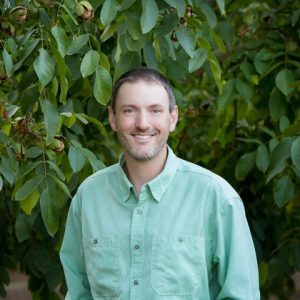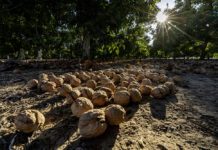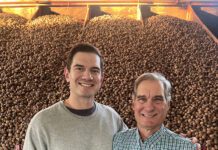
Davin Norene worked on his family farm long before he started managing the walnut-growing side of the operation. As a pre-teen boy, he started his farming journey sorting peaches in the field.
Those peach trees are long gone, the perennial acreage converted to walnuts, but his love of farming lives on. As the president and owner of Big Time Farming LLC, Norene now oversees the family’s nut-growing business with guidance from his dad, Donald Norene.
Founded in 1954, the family growing operation has seen the ups and downs of nearly 70 years of California agriculture, and they continue to adapt to new technologies and challenges. From irrigation and pest management to pruning and cover cropping, Norene and everyone who works at Big Time Farming seek to integrate the best growing practices into their operation.
Norene also serves on the California Walnut Board, helping to position the industry for the future.
We asked Norene to share his perspective on the current and future state of the walnut-growing industry in California.

What crops do you grow?
I am a walnut grower. I grow safflower, hay and silage as rotational crops when redeveloping an orchard and sometimes in between tree rows of young orchards. I also grow a small amount of rice, and my family’s operation includes beef cattle.
Where do you farm?
My farming operation is centered in Rio Oso, Calif. We have orchards in both Yuba and southeast Sutter County in the Bear River watershed.
What is the history of your farming operation?
My grandfather, Roy Norene, started farming in the 1940s and formed Norene Ranches, Inc. in 1954. He and my grandmother, Merle Norene, built an operation that included walnuts, cling peaches, rice and irrigated pasture for beef cattle. They also had an impressive stable of cutting horses.
After my grandfather passed, my father, Donald Norene, and my uncle, Jerry, continued the operation. We had a cling peach receiving station and a walnut huller/dryer. I started working during peach harvest when I was 11 or 12 years old, sorting peaches in the field. When I got older, I drove a forklift at our peach station.

Today, all of the family perennial farming ground is in walnuts, and I manage this operation with the guidance of my father. My uncle continues to operate the beef cattle and rice farming.
How have your farming practices evolved in recent years?
Over the past decade, we have made changes/improvements to:
Irrigation management: We’ve added more robust pressure bombing combined with the soil moisture sensors placed throughout the ranch. We also use real-time weather stations placed throughout the ranch to guide irrigation and management decisions.
Pest management: We use specific chemistry to target pests and protect beneficials while we manage our perennial cover crops to encourage the presence of beneficial insects.
Pruning: Our pruning practices continue to evolve as our orchards continue to evolve. More vigorous rootstocks, new cultivars (e.g., UC Wolfskill) and different tree spacing densities all require adjustments to pruning practices/canopy management. Our orchards are a living laboratory.
Cover cropping: We started cover cropping in 2011 to address problems in an orchard with very coarse-textured soil. Today, each pre-productive orchard receives a custom cover crop program to address the site-specific challenges or objectives.
Minimal mowing and soil disturbance: We try to minimize compaction, erosion and water run-off while maximizing carbon sequestration. We add organic matter to the soil by minimizing tillage during pre-productive stages of orchard development, cover cropping and specific mowing practices.

What are the three things that keep you up at night related to growing walnuts?
Walnut quality, taking care of employees and their families, and being a good steward of my family ranch. These are circular, not linear, goals for our operation. Being the greatest steward I can be for the ranch while creating a productive and supportive work environment for our employees will ultimately help provide the best quality walnuts. And if we’re offering the best quality walnuts, and therefore selling more walnuts, then we can continue to take care of our employees and their families in a meaningful way.
What are you most hopeful for in the future when it comes to farming nuts?
That California will be the leader in bringing quality walnuts and walnut products to the world market. There has been a rise in global competitors in recent years, but I’m confident that California can continue to deliver the best quality walnuts and walnut products.
What in your opinion needs to happen to set the industry in the best possible direction for the future?
A focus on quality and telling the story of the managed forests where we grow California walnuts and the family farmers who do it. We have a great story to tell about family farmers who manage uniquely diverse ecosystems that produce California walnuts.
People want to know where their food comes from and who is growing it. Family farmers are the best voices for sharing this story. We live and breathe it and raise our families in it. We need to get the message out clearly and saliently and let people see all the good that we do.
What do you think the biggest assets are of the nut industry in California?
In my opinion, the biggest asset for walnuts in terms of consumer appeal is that walnuts are a wholesome, plant-based protein grown in a way that benefits the environment. Walnuts are the only tree nut that provides an excellent source of the plant-based omega-3 ALA (2.5 g of plant-based omega-3 ALA per ounce), which research indicates may play a role in heart health, brain health and healthy aging. It feels good to grow something that’s good for you.
What is your proudest achievement as it relates to your professional development?
As an elected member of the California Walnut Commission, I am proud that my fellow walnut growers trust me to be one of the contributors planning our industry’s future. It’s an honor to chair the Market Development Committee, serve on the Issues Management Committee and act as advisory counsel to the California Walnut Board’s Production Research Committee.
How do you give back to the community both in agriculture and in the community where your operation is based?
I work to give back to my walnut community through my service on the California Walnut Commission and as counsel to the California Walnut Board. Before I had young kids, I was on the Board of the Farm Bureau. Now, I spend my time being as involved in my kids’ activities as I can, including coaching their Little League team. My wife and I are doing our part to raise the next generation of California walnut growers.
What advice do you have to a young person getting into farming nuts today?
Learn your craft and love your craft. Growing walnuts is a long-term, generational investment. Like in many generational enterprises, some years are tougher than others. So, fall in love and be persistent.
Who was the biggest influence or mentor for you in your career?
My father, Donald Norene, a titan of the California walnut industry. He is one of the most innovative and astute walnut growers. He has volunteered countless hours working to grow the California walnut market, served as a former chairman of the California Walnut Commission and was an early adopter of research to improve walnut production and irrigation.
What do you think the biggest advancement has been in the field of nut growing during your career?
New rootstocks.
What advancements do you foresee having a big impact in the future?
Soil health and water/irrigation management.















